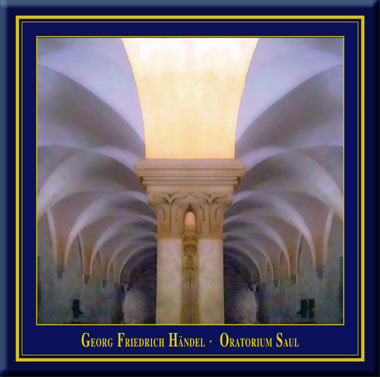With soloists including Michael Chance, Stephen Varcoe, and Nancy Argenta,
this Saul ought to arouse the curiosity of most Handel aficionados.
This is the fourth Handel oratorio recording to have been made at
Maulbronn Monastary (near Stuttgart) under the competent direction of
Jürgen Budday. The previous volumes included abridged versions of
Jephtha with Emma Kirkby and Julian Podger on fine form, and Samson
with David Thomas and Michael Chance giving characteristic if not flawless
performances. The last was Judas Maccabaeus, arguably the most
consistent of the K&K recordings so far.
All those three, like this new Saul, are by no means as terrible as
the tag “Live recording” might imply. The recordings are a shade too
reverberant for small details to be heard clearly, but the acoustic is
nonetheless attractive. The only disadvantage of the live recording is
that occasionally a soloist’s blunders in performance can come back to
haunt them. For example, a few of Marc LeBrocq’s higher phrases would not
get past the editing process involved in a studio recording. The sound
quality itself is excellent, and only mistakes during performance and the
applause at the end of it reveal how naked it really is.
The Maulbronn Chamber Choir are O.K., and its English pronunciation only
occasionally slips beyond repair. It is certainly well disciplined and
blends reasonably well, although on this new Saul the soprano
section struggles with tuning and tone. The orchestra play fairly well,
but the violins are often scrappy. The opening chorus “How excellent, thy
name O Lord” establishes the potential quality that this performance could
have reached, with an impressive confection of swaggering stylishness. It
is therefore a shame that the ensuing action is so often undermined by
pregnant pauses between numbers, and some rather mystifying treatment of
crucial moments such as a lack-lustre “David his ten thousands slew”.
A bored producer would certainly have shouted at everybody to get on with
their pious and lumbering delivery of recitatives by showing a bit more
commitment and dramatic awareness. Stephen Varcoe’s Saul would not throw a
spear at anybody, and lacks the requisite jealousy, spitefulness, and
portentous grandeur that the role demands. Michael Chance and “O Lord
whose mercies numberless” would have once seemed an ideal combination, and
his singing remains lyrical and intelligent even if not quite as
effortless as it once was (by the way, the harp solo is performed on the
theorbo, which is a better solution than not at all). Chance still has
many of the fine attributes that made him arguably the best English
countertenor of the 1980s and early 1990s, but he misses the mark in his
other arias due to the general lack of theatre infecting the entire
performance. Only in an especially good “Impious wretch” does Chance get
the opportunity to shine like his admirers would wish.
Nancy Argenta, another fine baroque singer, makes little impact. Marc
LeBrocq’s Jonathan sings sweetly but without much enthusiasm. Laurie
Reviol’s Merab gets the job done. But the performers do not sound excited
enough to be performing in one of Handel’s most compelling music dramas.
Most of this cast would have had world-beating potential fifteen years ago
and a recording like this would have been greatly desired, but one cannot
help but feel disappointed by this belated effort.
Despite the flaws of the K&K Handel performances, they have previously
demonstrated a commendable spirit and good intentions. This Saul
simply fails to ever launch itself onto a sufficient level. There is
nothing here to really offend Handel lovers, but the general lack of
charisma and slow pacing – which is a distinct issue from Budday’s tempos,
which are all fine – let the overall impact of the oratorio down
considerably.
It is a crying shame that this recording is so disappointing, but I do not
wish to imply that it is awfully bad: if I were to attend a local amateur
performance of this standard I would be thrilled. As it is, Budday’s
Saul is hardly the worst recording of the oratorio yet made: that
dubious honour goes to the abrasive and incoherent version by Nikolaus
Harnoncourt (Teldec). This is closely followed by Joachim Carlos Martini
(Naxos), whose decision to perform Saul even more complete than
Handel ever did fails to obscure the generally dismal quality of his
performance. Yet Budday’s contribution cannot be safely recommended to
anybody apart from those who already know the quirks of K&K’s recordings
and are prepared to take the risk in order to enjoy the odd moment of
illumination. Gardiner (Philips), Neumann (MD&G), and Ledger (Virgin) have
all recorded Saul complete, and each present very different yet
captivating experiences.


